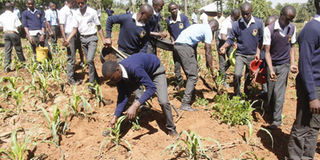Ministers need to stand up for farmers

Agriculture students from Koderobara Secondary School in Homa Bay launch a campaign promoting organic farming, in which they educate local farmers on the benefits of organic farming. An estimated over 90 per cent of the food produced in Kenya is done by small-scale farmers. PHOTO | BERNARD OJWANG | NATION MEDIA GROUP
What you need to know:
- Farmers are losing over 60kg of produce for every bag they sell to traders.
- It is very encouraging to see that the national government, through the Cabinet Secretary of Industrialisation is working with the county governments to harmonise or remove produce cess altogether, citing increased cost of doing business for the farmers.
- Attempts to implement the 50kg maximum weight regulation have been faced with legal battles from traders questioning the authority of the county government in enforcing the law.
- Cabinet Secretary Bett needs to work to protect agriculture by invoking the law. This law is very clear on the need to register growers and licence produce marketing agents, commonly known as brokers.
It is estimated that over 90 per cent of the food produced in Kenya is done by small-scale farmers.
However, smallholder farmers are some of the poorest in the supply chain of food produce in Kenya, and also globally.
Kenya’s farmers are at a disadvantage position in the produce trade due to legal challenges that have exposed them.
Even though the law revised the minimum produce weight to 50kg maximum based on International Labour Organisation regulations, the law has failed to be implemented to its fullest thereby leaving poor farmers vulnerable to exploitation by traders.
It is very encouraging to see that the national government, through the Cabinet Secretary of Industrialisation is working with the county governments to harmonise or remove produce cess altogether, citing increased cost of doing business for the farmers.
It is, however, very sad that the very low hanging fruits that can be tapped to increase farmers’ income like implementation of the maximum produce weight regulations has been left unattended to.
Farmers are losing over 60kg of produce for every bag they sell. A good example is a bag of potato that ought to contain a maximum of 50kg is filled up into a jointed extra bag to weigh 110kg and is bought at farm gate price of Sh2,500.
The same bag is then redistributed into 50kg sacks and sold at Sh3,200 per 50kg bag. You will be shocked to see how much you pay for potato crisps and chips in the market and ask yourself why farmers cannot earn decent living from farming.
FORM ASSOCIATIONS
Attempts to implement the 50kg maximum weight regulation have been faced with legal battles from traders questioning the authority of the county government in enforcing the law.
The produce value chain in Kenya is the most skewed in the region, consumers and farmers alike, are left at the mercy of traders and manufacturers.
Someone must come out and stand for the farmers. And these should be none less than Cabinet secretaries Willy Bett (Agriculture) and Adan Mohamed (Industrialisation).
They need to work very closely with the Council of Governors to speedily have in place measures and capacity to fully implement the Food Crops Regulations, at the same time putting in place infrastructure, mainly cold storage facilities at county levels to ensure that farmers have the capacity to store produce without having to remain vulnerable to unscrupulous traders.
In addition, the local leaders need to encourage farmers to form associations through which they can sell their produce.
Cabinet Secretary Bett needs to work to protect agriculture by invoking the law. This law is very clear on the need to register growers and licence produce marketing agents, commonly known as brokers.
This regulation is very clear on the need to have all growers register into co-operatives or grower groups and that all marketing agents intending to enter into contract with the grower associations need to register the contracts with AFA and witnessed by the county government and that all scales used to weight such food crops must be calibrated and accurate.
The writer is the chairman of Society of Crop Agribusiness Advisors of Kenya [email protected]



